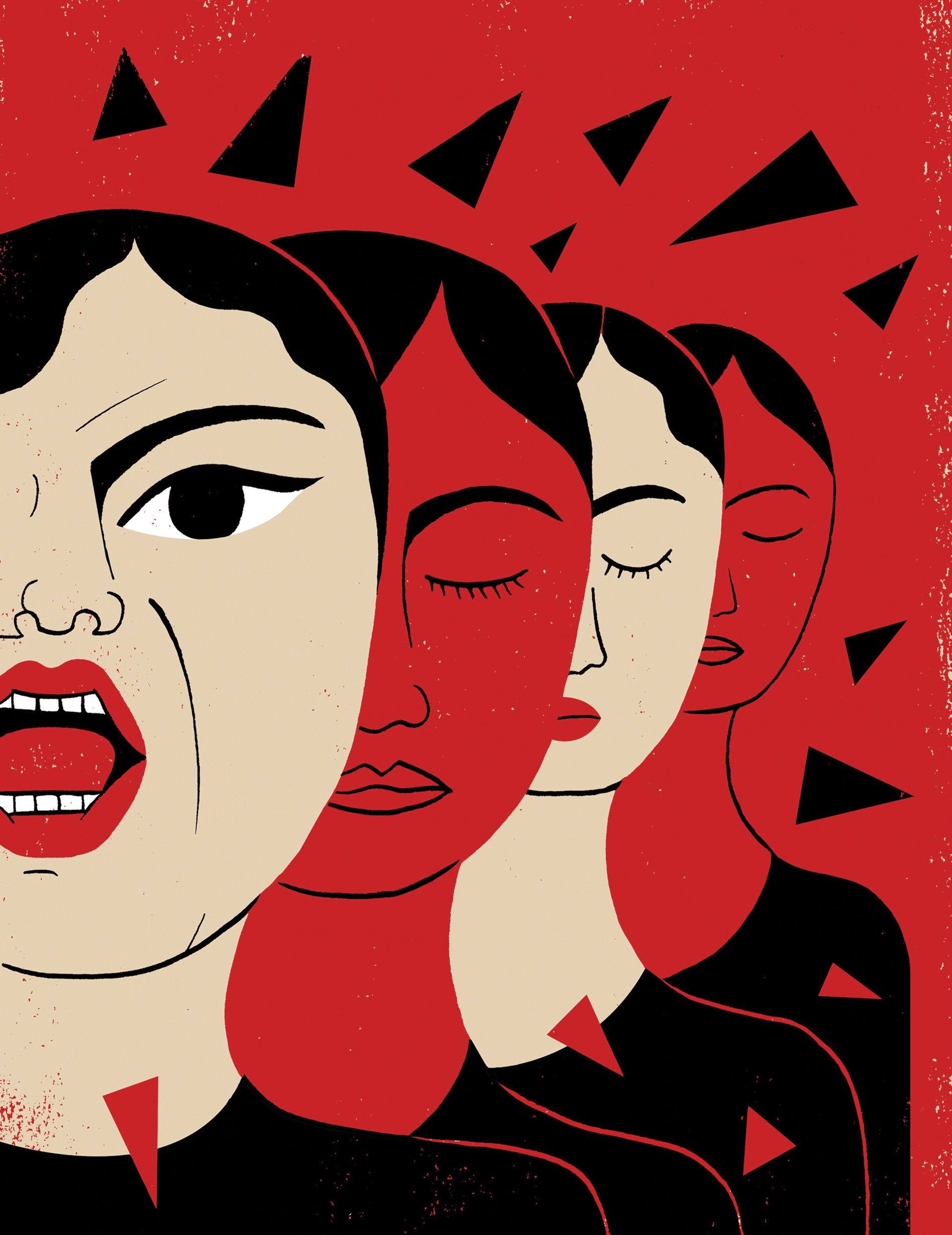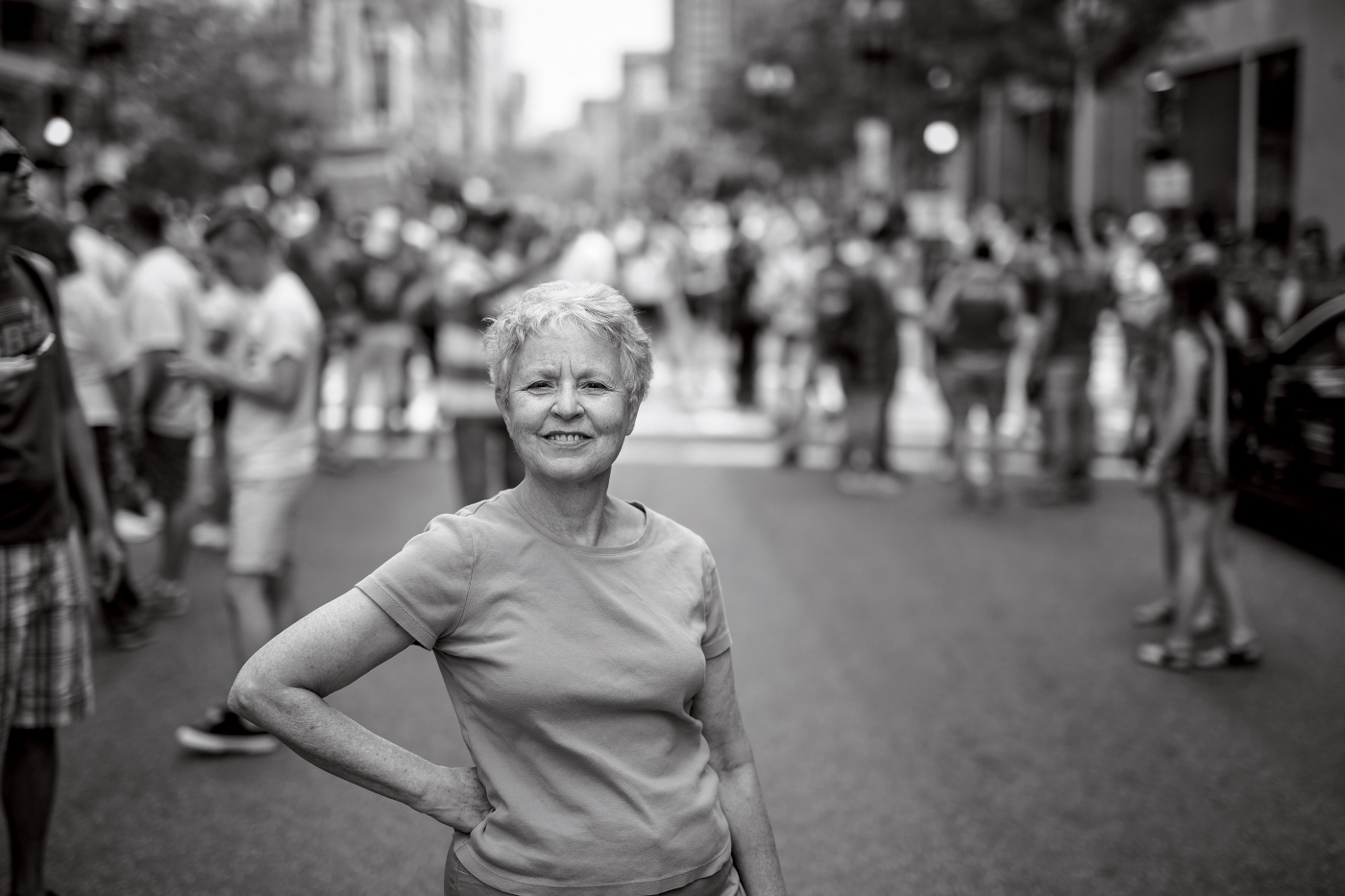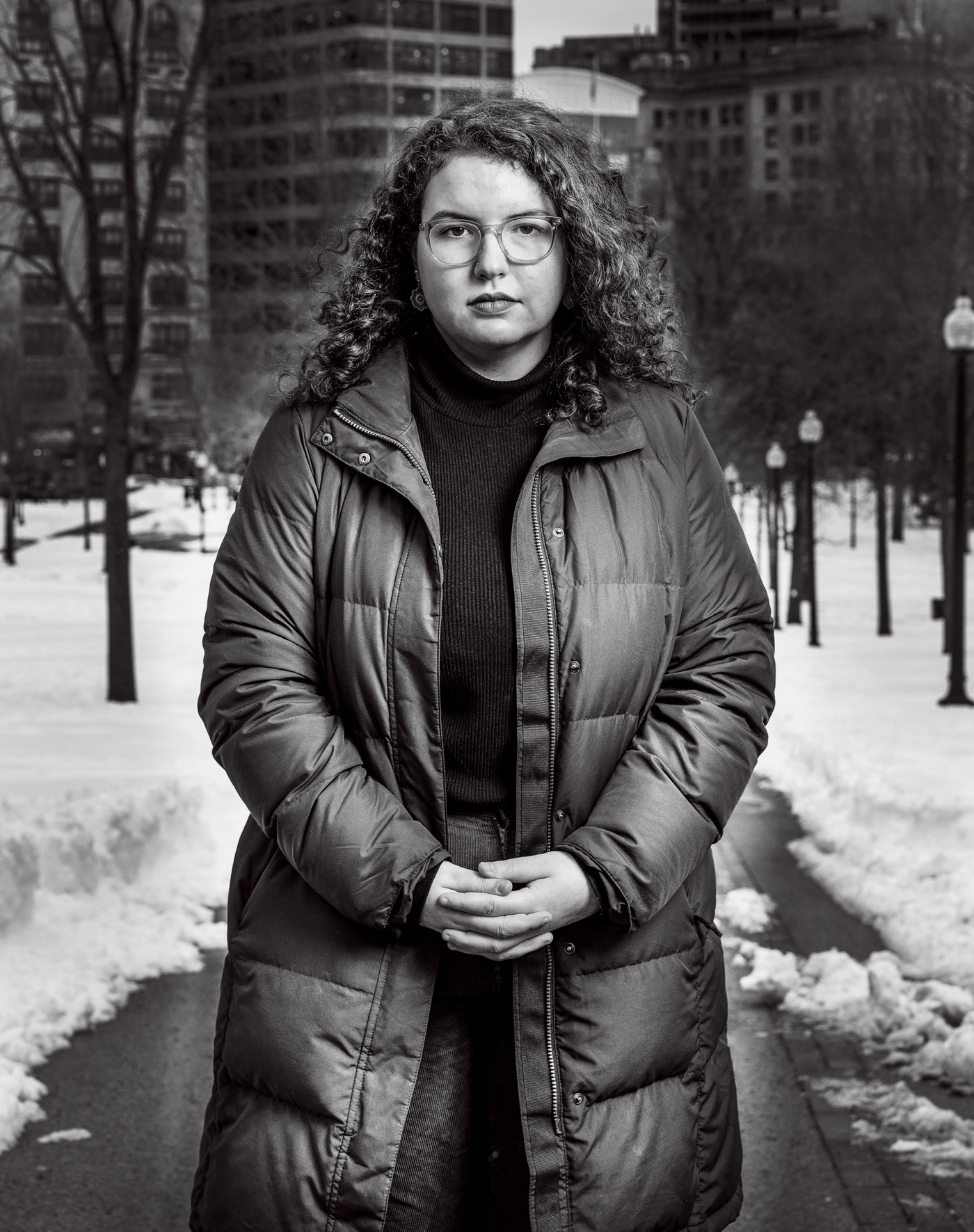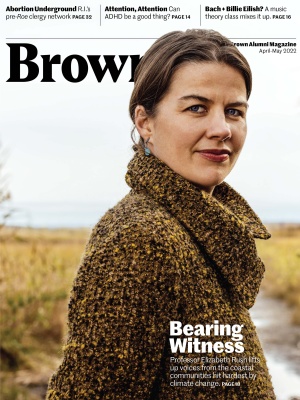
Holding the Line
Through women’s empowerment groups, class action lawsuits, protests, and clinic defense, Brown students and alums have worked to obtain, preserve, and protect abortion rights for more than 50 years.
On December 1, the U.S. Supreme Court heard the first arguments in favor of a Mississippi state law banning nearly all abortions after 15 weeks of pregnancy. This year, justices will decide if that law is constitutional. If the verdict is affirmative, the protections granted by the landmark case Roe v. Wade will disappear in over 20 states around the country. After the passage of the Reproductive Privacy Act (RPA) in June 2019, however, Rhode Island won’t be one of them.
“If that day comes, it will be a horrible day. But I will also be thinking: ‘Thank God we passed it,’” says Maeve Wiesen ’21, who was president of Brown NARAL (National Abortion Rights Action League) Pro-Choice and a regular fixture at the Rhode Island State House during the spring of 2019, when the RPA was under review by the state legislature. Anytime the bill was on the floor, Wiesen and her friends were there marching, chanting, and testifying in its favor.
“There were a thousand steps to it passing, and so I was kind of in disbelief when it did,” she says, adding, “You only want to let yourself feel good about it for a little while, because then you have to go back to thinking about what we didn’t do… but I was very proud to have played even some small part in it.”
For NARAL and other reproductive justice groups on campus, this victory represents only the most recent in a decades-long and nationwide battle for greater reproductive freedom. For over 50 years now, women on College Hill have beat the drum for reproductive rights, refusing to shut up until their demands were met.
In the beginning, though, there was only silence.
Prior to Roe and prior to the 1960s, the one thing we know is about silence,” says Mary Murphy, archivist at the Pembroke Center. “Evidenced through a number of our oral histories, women did not often discuss their own healthcare, their own needs with one another. There was an entrenched silence; it’s like women pathologized the fact that their bodies were being controlled and that they really shouldn’t talk about it.”
Despite small discussion groups that began to spring up informally in the mid- to late ’60s, women on campus largely felt isolated, left to muddle their way through sexual health alone. Several Pembroke College alumni reported that they worried constantly about reproductive care but never felt like they could talk about it with anyone. In the rare moments they did, it was always with a whisper. The era of silence finally broke, however, on August 26, 1970, the day of the Women’s Strike for Equality.
“That galvanized people,” says Mimi Pichey ’72, one of the cofounders of Women of Brown United (WBU), an organization that held its first meeting just one month after the strike with the goal of empowering female students and faculty to advocate for women’s rights both on and off the Hill.

“For the first time we saw 50,000 women in New York out on the street,” she adds, “and all these women who had just been having little groups in dorm rooms said, ‘Hey, this is bigger than just the five of us.’ And that’s why we got a hundred people at that first meeting.”
In 2020, Pichey compiled an extensive history of WBU that reports that the group tackled everything from Title IX to affirmative action in its inaugural year. Pichey, however, was deeply entrenched in abortion rights activism. She still vividly remembers one of the earliest subcommittee meetings, when three of the 10 women present shared their traumatic experience attempting to seek an abortion pre-Roe.
“We didn’t know at the time that one in three women in their lifetimes would get an abortion,” she says. “Everyone thought that these were individual problems. And so all of a sudden, women were going around the room and having this revelation that it wasn’t just them—it was a gender issue, not an individual issue.”
Of the three, only one woman—a friend of Pichey’s who studied at RISD—was able to obtain a legal abortion. “She had to go before a panel of three male doctors and claim that she would have a mental breakdown if she were forced to bear this child, and it went on her record that she was mentally unstable,” recounts Pichey. “She was there for two nights and they treated her like she was some sort of a criminal, and for this privilege, her parents paid $2,000 [approximately $15,000 today].”
The other two women were forced to seek illegal abortions, and both eventually found someone “through the underground” who would perform the surgery if they came at night with $600 in cash (approximately $4,300 today). They were knocked out on a kitchen table and worried about sepsis for weeks, Pichey says, “but that’s what it was like: if you went for an illegal abortion, you took your life in your hands. And that’s what we face if we lose Roe protections.”
In order to gain those protections in the first place, WBU followed the strategy of the national abortion advocacy movement. After sending out over 250 letters that fall to organizations around the state, WBU established the Rhode Island Coalition to Repeal Abortion Laws (RICRAL) in February 1971, ultimately launching a class action lawsuit against the state that December. Over the next 14 months, Women of Rhode Island v. Richard Israel made it all the way up the judicial ladder until on February 9, 1973—just two weeks after the decision on Roe v. Wade—a court struck down Rhode Island’s abortion laws as unconstitutional.
“All of a sudden, women were having this revelation that it wasn’t just them—it was a gender issue, not an individual issue.”
Even with these victories, however, the fight for equal access to safe abortions was far from over. The next step, Pichey says, was to get Rhode Island hospitals and providers to perform abortions at reasonable costs. Hospitals at the time were “very conservative,” according to Muffin Traber ’75, chairman of WBU’s abortion subcommittee at the time. “They’re really afraid to take any action because of backlash,” Traber said in an issue of the Brown Daily Herald published just days after the 1973 decision, “but we can’t let women be exploited by the medical profession with outrageous rates for abortions.” By that fall, two Providence hospitals had begun performing abortions regularly and at a cost that—though far from accessible—was slightly more within reach.
The response was, of course, an even more fiery backlash from anti-abortion groups both locally and nationally that has kept reproductive rights activists on the defensive for decades. Minutes saved from a WBU meeting in November 1977 noted that Rhode Island’s Women and Infants Hospital was threatening to close its abortion clinic, and in 1980, Congress passed the Hyde Amendment barring the use of federal funds to pay for abortion except in extenuating circumstances. Though not a constitutional amendment, the legislation continues to significantly impact Medicaid recipients, many of whom are forced to pay out of pocket to have an abortion without the support of government funding.
In Rhode Island, where anti-abortion protesters were out in full force following the ruling in Women of R.I. v. Israel, harassment outside of abortion clinics steadily grew more and more aggressive throughout the 1970s and into the early ’80s. In response, WBU member Pamina Gorbach ’87 established an escort service in 1985 to guide patients through armies of screaming protestors safely into the Women’s Medical Center in Cranston. By 1987, over 50 Brown students of all genders were trained as clinic escorts, learning how to set patients at ease and respond to the often violent remarks from pro-life protesters without escalating the situation or taking a political stance.
Recorded interviews with escorts from 1988 recount the altercations that several young women endured in harrowing detail. “The very first woman I escorted burst into tears by the time I got her to the door, and that really blew me away because… I had expected the protestors to be somewhat sincere, but I found them to be mainly cruel, very vicious people who just do not care about these women,” said Sara Fass ’89, one of the escorts who volunteered that spring. Fass described threats from protestors that frequently forced volunteers to call the police, including one man who beat a patient over the head with a crucifix.
“In the name of Christ, they’re trying to dissuade these women from what they consider an American Holocaust,” Fass added. “I’ve never really considered myself pro-choice, but when you go and actually see the amount of psychological abuse that these women undergo… it makes you feel like what you’re doing is a good thing.”

BAM’s editorial content director, Louise Sloan ’88, volunteered alongside Fass and became curious about the screaming protesters and their backstories—what was motivating them to do this, week after week? She ended up interviewing a number of them for a 1988 feature story in The Phoenix’s NewPaper, a Providence-based alternative weekly. Though many of the protestors were older men, Sloan also encountered a number of women among the self-styled “sidewalk counselors,” including Julie Bangs. Bangs’s young adult life was marked by poverty, abuse, and neglect—but what brought her joy despite all hardship, she said, were her two children, including a son that her ex-boyfriend had demanded she abort. “I was on welfare for about two years, [and] they don’t give you too much money,” Bangs said. “I went without a lot of things, but I was never happier.”
Bangs told Sloan she hoped to use her experience to demonstrate to women entering the clinic that there were alternatives to abortion and resources accessible to those who chose to keep their child. “I’m not there to condemn them, I’m there to help them,” she added—“there is help available.” Though Bangs said she didn’t like to wave the signs carried by many of her counterparts (she considered them “kind of on the threatening side”), she was not without moments of passion. On one occasion, she screamed “Liar!” at Fass repeatedly outside the clinic, which ultimately landed Bangs in court alongside the man with the crucifix.
Alison Buckser ’89, another volunteer from that year, remembered one particularly striking faceoff where she attempted to comfort a woman while standing directly opposite a pair of protesters. It’s “that classic picture of the man: on one shoulder you have the devil, and on the other shoulder you have the angel, and both of them are arguing over his soul, and I wonder, Am I the devil or am I the angel?” she said. But for Buckser, the taunts and jeers that she and other escorts suffered only reinforced the importance of their service to the community. “I feel like I’m actually fighting for this woman’s soul at times… [but] my purpose isn’t that I want the woman to have an abortion. I merely want her to have the chance to choose.”
If Women of Brown United forged any gains in the fight for reproductive justice, much of it is owed to the same organizations that continue to inspire abortion activism on campus.
“NARAL was the blueprint for what was going on in all these states,” explains Pichey. “They and others were launching class action suits all over the place, so we modeled ourselves on what they were doing, and that’s why we were able to make fantastic progress so quickly.”
Today, Wiesen notes that the biggest opposition to progressive abortion legislation in the state is Rhode Island’s strong religious base. Various Catholic contingents regularly flock to the State House by the busload, armed with posters of dead fetuses and decked out in baby blue.
“On any day where there’s action on an abortion bill, the Rhode Island State House is a zoo full of mostly anti-choice people,” adds Wiesen, who regularly attended legislative sessions with other members of Brown NARAL to stand in solidarity with Planned Parenthood and other pro-choice organizations. “Once you get through the metal detector and you are looking at the rotunda in the center, you’re like, ‘Oh my God, there are hundreds of people in here and most of them think that we want to kill babies.’”
“I wonder, Am I the devil or am I the angel?”
Fifty years ago, however, religous organizations comprised a solid chunk of Providence’s pro-choice coalition (see sidebar), standing in opposition to a much larger and more deeply entrenched status quo. “It was too early for churches to be organized against us at that point,” says Pichey. “[Restrictions on abortion] were just the general societal norm.”
Pichey recalls walking into a dorm filled with old friends from her freshman year, only to be greeted with the bitter “Oh look, here comes Little Miss Women’s Liberation!” Meanwhile, Wiesen is proudly known among her peers as “the abortion girl,” one sign that society has shifted significantly, altering both the scope of the battle at hand and the perception of the women who are fighting it.
“Roe and legality is the floor—it’s not the ceiling. Codifying Roe is really important, but it does not increase access to abortion for marginalized people,” says Wiesen. This sentiment is echoed by Ivy Bernstein ’21, one of the leaders of Feminists at Brown who protested alongside Wiesen at the State House.
“It’s definitely something that I think about a lot in the mainstream feminist movement,” says Bernstein, “to not just create one narrative of, ‘This is the white, middle-class lady who needs an abortion, and that’s why we’re here.’ Reproductive justice is a lot more than that—it’s intersectional and it’s about having the right to bodily autonomy, to make choices that are right for you, whoever you are.”
Indeed, some of the most recent battles in abortion advocacy right now—the fight for increased accessibility—aren’t very new at all: even if abortions have technically been legal for 49 years, the rules on who can get one and when are anything but even.
“Our goal was that abortion would just be part of regular health care, and who would have thought 50 years later that we’d still be fighting many of the same fights?” Pichey says. “I’m glad that young women are finally waking up and realizing that overnight this could be changed, and that they’re joining us old gray hairs in the fight.”
Ivy Scott is a criminal justice reporter at the Boston Globe. She has reported in cities from Port-au-Prince to Paris for numerous publications.
Read this article’s companion piece, “A Theology of Choice,” here.
Written by Gillian Frank ’03 AM, ’09 PhD, it is a history of Brown chaplains’ leadership of an organization that helped Rhode Island women access abortions pre-Roe.





